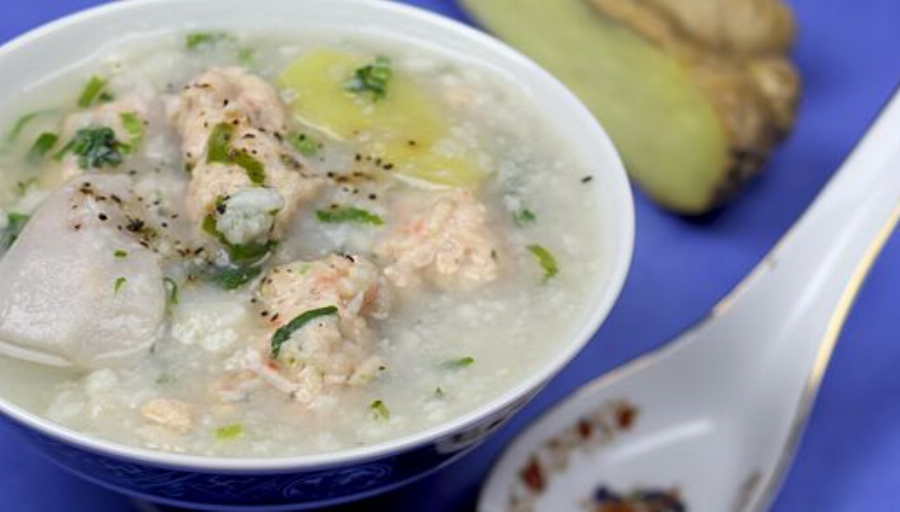Khoai mỡ is an exotic yam that originates from Asia. The root vegetable has a rough, charcoal-colored skin with a creamy flesh. It’s grated and cooked until soften. The texture is unique once it’s cooked. It’s resembles pork fat, hence the word ”mỡ”, which means ”fat” (”khoai” means ”potato”). Like many other Buddhist vegetarian dishes, this ingredient is used to imitate meat. However, this time I served it with shrimp balls and taro pieces (”khoai cao”) in a soup.
This vegetable was not available in France, so I didn’t have it as a child. I first tasted it in a temple in Saigon. It’s very versatile, and can be served either as a dessert or in a ”canh” (”soup” in Vietnamese). Khoai mỡ is one of those ingredients that are quite expensive in America but cost almost nothing in Saigon. In Vietnam, this type of root vegetable are planted in great abundance but here, in the US, canh khoai mỡ is more a nostalgic dish that takes you down memory lane if you grew up in Vietnam.
1. Info for Canh Khoai Mo Recipe (Vietnamese Yam and Shrimp Soup)
- Cook Time: 40 mins
- Total Time: 1 hr 5 mins
- Servings: 8
- Calories: 544kcal
2. Ingredients for Canh Khoai Mo Recipe (Vietnamese Yam and Shrimp Soup)
- 1 tablespoon canola oil (or any neutral oil)
- 2 shallots, thinly sliced
- 1 (10.5-ounce) can chicken broth
- 1 (1-inch) chunk fresh ginger, peeled and thinly sliced
- 1 large khoai mỡ yam
- 2 taro roots, peeled and quartered
- 8 ounces raw medium shrimp, thawed and deveined
- 1 teaspoon dried crispy fried garlic (see tips), store-bought
- ¼ teaspoon red chili powder
- 2 green onions, thinly sliced
- 1 chunk rock sugar (about 2 ounces), or 1 tablespoon granulated sugar
- 1 teaspoon mushroom seasoning salt
- 3 tablespoons cilantro, chopped
- ½ teaspoon black pepper, freshly ground
- 1 tablespoon nước mắm, to taste
3. Directions:
- Frying the shallots: Heat the canola oil in a small pan. Fry the shallots in the oil, stirring frequently to prevent the shallot from burning, until the color is evenly golden brown. Reserve the oil. Drain the shallots on paper towels. Set aside.
- Seasoning the broth: Bring the chicken broth and 3-½ cups water to a boil in a 2-quart pot. Add the rock sugar, sliced ginger and half the amount of fried shallots. Lower the heat to medium-low and cook for about 15 minutes. Add the taro root and cook for another 5-10 minutes. Set the heat on low while preparing the rest of the soup.
- Prepping khoai mỡ: Peel the yam using a vegetable peeler. Once peeled, the inside is a little gooey and can become slippery, so only wash it once it’s entirely peeled. Wash it and pat dry. Using the largest holes of a box food grater, scrape the root. Immediately transfer to a pot.
- For the shrimp balls: In a bowl, season the shrimp with the remaining fried shallots, 1 teaspoon of fried garlic, salt, red chili powder, black pepper and 1 teaspoon of cilantro. In a food processor or a mini-blender if you have one, blend the shrimp into a thick paste. Add a teaspoon of green onion. Form tablespoon-sized shrimp balls.
- Assembly time: Bring the broth back to a boil. Add the shrimp balls, one at a time. Cook for about 2-3 minutes. Add fish sauce (nước mắm) and bring the broth back to a boil. Add a drizzle of the reserved onion-infused oil.
- Depending on how thick and creamy you like canh khoai mỡ soup, you can add up to 1 cup of boiling water or more chicken broth.
- Cook for a minute, then add the green onions. Turn off the heat. Cover and let the soup sit for about 5 minutes. Sprinkle with more black pepper.
- Serve hot with more cilantro. Drizzle more nước mắm over the broth to finish (to adjust seasoning).

